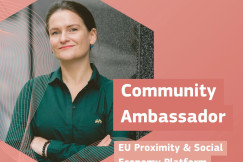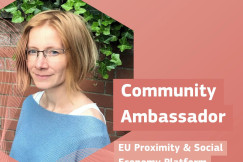Best practices
07 July 2025
Solid’R International: A cross-border label advancing the social and circular economy
Best practices
07 July 2025
Regenerative Green Transition
Working conditions and governance
Proximity and social economy
+18 more
Login / create an account to be able to react

Solid’R International is a voluntary label that certifies social economy organisations committed to ethical, inclusive, and circular practices. Active in four EU countries, it helps donors and authorities identify responsible collectors and promotes cross-border collaboration for a more sustainable economy.
Topics
Belgium
France
Italy
Spain
Academic / Research and VET Institutions
Business Support Organisation
EU Institutions
Financial Institutions and Investors
International Organisations
Local Authorities
National authorities
Networks and Federations / Confederations
NGOs / Non-profits
Regional Authorities
Social Economy Entity
-
Thematic area
-
-
Regenerative Green Transition
-
Working conditions and governance
-
-
Interlinkages with other sectors
-
-
Proximity and social economy
-
Cultural and creative industries
-
Retail
-
Textile
-
-
Action areas and keywords
-
-
Addressing capacity and skills gap
-
Advancing gender equality and safety at work
-
Certification, labelling and self-regulation
-
Circular Economy
-
Corporate social responsibility (CSR)
-
Economic democracy
-
ICP rights & workers involvement
-
Industrial relation and social dialogue
-
Socially oriented territorial regeneration
-
-
Ecosystem focus
-
-
Proximity economy
-
Social economy
-
-
Scope of activity
-
-
International
-
Local/neighbourhood
-
National
-
Regional
-
Share
Established in 2002 by the Belgian federation RESSOURCES, Solid’R International is a voluntary certification label designed to distinguish social economy waste collectors from profit-driven firms. Grounded in principles of ethics and solidarity, the label identifies organisations that uphold social and environmental objectives while providing employment opportunities to marginalised workers. Since its international expansion in 2018, Solid’R has been adopted by 25 social economy organisations across Belgium, Italy, France, and Spain.
Challenges
The proliferation of donation boxes for used clothes, books, furniture, and other household items has led to public confusion regarding the final destination and ethical use of their donations. Profit-driven private operators have increasingly collected donated items for resale, making it difficult for donors and public authorities to identify organisations that genuinely create social and environmental benefits for local communities.
Solution
Solid’R International addresses these challenges by providing a clear certification for social economy organisations committed to ethical practices. To obtain the label, enterprises must demonstrate compliance with specific criteria, including prioritising people over profit, supporting marginalised individuals through work integration and education, maintaining a wage differential ratio not exceeding 1:4, employing democratic decision-making processes, and cooperating with other members. An independent certification body assesses applications, and an international committee composed of country representatives manages the label through a democratic and transparent process.
Impact and Success
The adoption of Solid’R has led to significant social and circular benefits:
- 25 social economy organisations have been certified (14 in Belgium, 9 in Italy, 1 in France, 1 in Spain).
- Approximately 80,000 tonnes of goods are collected annually, with nearly 50,000 tonnes repurposed.
- Over 4,500 individuals are employed, including around 1,500 in work integration programmes.
- Certified organisations benefit from improved access to public support and procurement processes.
- In regions like Belgium and Italy, the label is embedded in circular economy strategies.
- The shared label has strengthened cooperation, visibility, and market positioning of certified actors.
Solid’R International demonstrates how voluntary labelling can foster collaboration, transparency, and sustainability across borders. By aligning values and operations, the label supports the growth of a more responsible and inclusive circular economy.
Comments (0)
See also
-
30
Financing the Ecosystem Recap: December – January
- Categories
- Partnerships Regenerative Green Transition Skills +68 more
-
21
PSE Platform Ambassador highlight: Viktorija Bražiūnaitė, LISVA
- Categories
- Partnerships Regenerative Green Transition Skills +68 more
-
21
PSE Platform Ambassador highlight: Erdmuthe Klaer, REVES
- Categories
- Partnerships Regenerative Green Transition Skills +68 more




